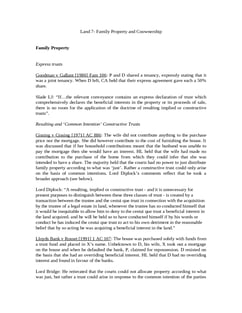Cheltenham & Gloucester BS v Krausz [1997] 1 All ER 21
Judgement for the case Cheltenham & Gloucester BS v Krausz
Table Of Contents
KEY POINTS
In mortgage proceedings, the challenge of possession and potential suspension orders is significant, especially when mortgagors face negative equity and aim to negotiate property sales, often complicated by mortgages refusing consent.
The interaction between the Law of Property Act 1925 and the amended Administration of Justice Act 1970 forms the legal context. T
his assesses the court's authority to suspend possession warrants pending High Court property sale orders, emphasizing the intricate nature of mortgage proceedings and the judicial considerations involved in possession, consent, and property transactions.
FACTS
-
The first Mortgagor, Aaron Krausz, and the second Mortgagor, Rebecca Josephine Krausz (‘The Mortgagors’) fell into arrears with their Mortgage repayments, prompting the Cheltenham and Gloucester Pic (‘Mortgagee’) to secure an order to possess the property.
Subsequently, warrants for possession were issued on four occasions.
However, the warrants were discharged each time through agreements between the parties.
Unfortunately, the Mortgagors defaulted on these agreements repeatedly.
Upon issuing a fifth warrant pending execution, the Mortgagors orchestrated a sale of the property to a charitable trust.
-
In response, they applied to the county court, seeking an order to suspend the warrant for possession.
This suspension was intended to be in effect while they applied to the High Court for an order authorizing the property's sale under section 91(2) of the Law of Property Act 1925.
-
The Mortgagees opposed the application, citing that the debt significantly exceeded the proposed sale price. Additionally, they contended that the suggested sale price underestimated the property's actual value.
Despite the Mortgagees' objections, the judge granted the order to suspend the possession warrant, allowing the Mortgagors to apply for a High Court order for the property's sale.
JUDGEMENT
-
In the Mortgagees' appeal, the court allowed the appeal, holding that the power to suspend possession was limited under section 36 of the Administration of Justice Act 1970.
The court could only use this power to assist the mortgagor in settling instalment arrears from non-property sale sources.
If a sale was proposed, the court needed assurance that the proceeds would fully discharge the mortgage debt.
Section 36 did not authorize the suspension of possession to enable the mortgagor to sell the property if the sale proceeds wouldn't cover the mortgage debt without additional funds.
The court rejected using its inherent jurisdiction to order the sale of mortgaged property under section 91 of the Law of Property Act 1925 when the mortgagee sought possession of a property burdened with negative equity. This was especially true when the mortgagor's primary goal was to negotiate their sale while still in possession.
In exercising its inherent jurisdiction, the county court couldn't properly suspend an order or warrant for possession to facilitate the mortgagor's application to the High Court under section 9. It was emphasized that the mortgagor was obligated to seek relief from the High Court before the possession warrant took effect.
It was determined that there was no jurisdiction for the judge to issue an order suspending the warrant for possession, leading to the allowance of the appeal on these grounds.
COMMENTARY
-
This case involves financial difficulties Mortgagors Aaron Krausz and Rebecca Josephine Krausz faced, resulting in mortgage repayment arrears.
Despite multiple possession warrants being discharged through agreements, the Mortgagors defaulted.
After orchestrating the property's sale to a charitable trust, they sought to suspend the possession warrant for a High Court order.
-
The Mortgagees opposed, citing the debt exceeding the proposed sale price. In the Mortgagees' appeal, the court clarified the limited power to suspend possession under the Administration of Justice Act 1970.
It emphasized that suspension aims to settle arrears, not enable a sale with insufficient proceeds.
The court rejected using inherent jurisdiction to order a sale, particularly for a property in negative equity.
The decision highlights the court's constrained authority and underscores the mortgagor's obligation to seek High Court relief before possession warrants take effect.
ORIGINAL ANALYSIS
Plaintiff was a mortgagor and a warrant for possession had been given to Defendant but Defendant had yet to execute the order, since under the current market conditions the house price would have been less than the debt owed to Defendant.
Plaintiff sued to try and obtain permission to sell the house themselves under s.36 AJA and suspend Defendant’s possession under s.91(2) LPA 1925.
-
CA rejected this, saying that s.36 only postponed possession to enable the mortgagor to repay from sources other than selling the house or, if a sale was proposed, the court had to be satisfied that it would be enough to discharge the entire debt.
S.36 did not empower the court to suspend possession in order to permit the mortgagor to sell the mortgaged premises where the proceeds of sale would not suffice to discharge the mortgage debt unless other funds would be available to make up the shortfall.
Therefore it could not suspend the warrant for possession nor allow Plaintiff to sell the house.
For Further Study on Cheltenham & Gloucester BS v Krausz
Need instant answers? Our AI exam tutor is here to help.
Ask questions 🙋 Get answers 📔 It's simple 👁️👄👁️
Our AI is educated by the highest scoring students across all subjects and schools. Join hundreds of your peers today.
Get StartedSimilar Cases
Related Product Samples
These product samples contain the same concepts we cover in this case.
| Land Law | Remedies Of The Mortgagee Notes (7 pages) |

